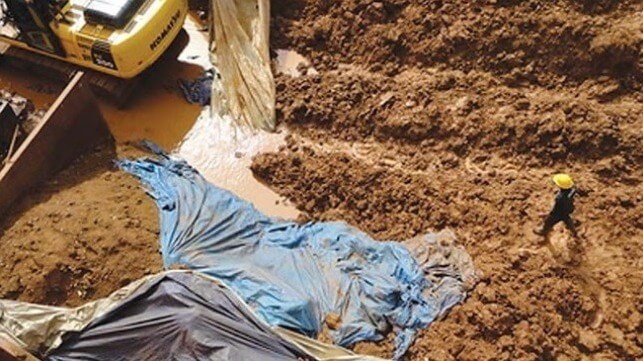Intercargo: All Stakeholders Need to Reduce Risk of Cargo Liquefaction

Dry bulk association Intercargo is once again calling for attention to the persistent hazard of cargo liquefaction, a deadly phenomenon affecting specific mineral ore commodities when they have too much water content. Cargo liquefaction can induce a severe list as the weight of the ore shifts to one side, sometimes leading to rapid capsizing.
In a survey of the past 10 years' worth of bulker casualties, Intercargo found that grounding was the number-one cause of total losses - but liquefaction was by far the leading cause of fatal casualties.
Out of 27 large bulk carrier losses, only five were caused by liquefaction, but this handful of sinkings accounted for 76 percent of the loss of life. Four of these lost bulkers were carrying nickel ore and one was carrying bauxite, both cargoes known for liquefaction risk.
While shipowners have been advised of this risk many times over the years, Intercargo is aiming its warning at other audiences this time - cargo interests, regulators and the many other stakeholders who have a say in what gets shipped and how.
"It is the lack of consolidated effort and commitment from many stakeholders to resolve the problem that is evident. These can include shippers, receivers and port state authorities at loading and discharging ports," said Uttam Kumar Jaiswal, the vice-chairman of Intercargo. "We need action from those our industry relies upon for its safety – the IMO, legislators, and suppliers to ensure that that the minimum obligations under the IMSBC Code are properly fulfilled."
Tough shippers
The IMSBC Code places responsibility for testing the cargo squarely on the shipper, but the reality on the ground may be completely different in the remote Southeast Asian islands where nickel ore gets loaded.

that matters most
Get the latest maritime news delivered to your inbox daily.
"Although the Code sets out shippers’ obligations very clearly, in reality they were rarely complied with," assessed Janice Dao Yeung Yeung, senior claims executive and lawyer for Skuld P&I Club, in a 2019 essay for the International Institute of Marine Surveying. "Local shippers/mines are very influential organizations and they are often armed. When a master or local surveyors keep rejecting bad cargo, local surveyors might receive death threats from shippers."
This is the most extreme example of noncompliance, but far from the only one. Shippers' certificates for the cargo's properties are often forged; dry cargo can be placed over wet cargo to disguise it; and if a master rejects a bargeload of ore over excess moisture content, the shipper may simply offer the same bargeload to another nearby vessel, she found. These risks are known in the trade, but masters are often under heavy commercial pressure from charterers / shippers to accept the cargo as delivered, Yeung Yeung wrote.
